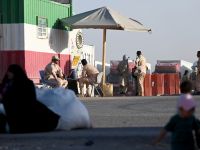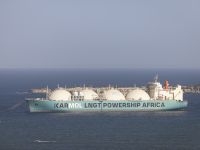A Palestinian member of parliament said that he does not rule out that the United States and Israel have plotted the brutal crackdown on the Palestinian uprising, in a bid to lay pressure on the Palestinian leadership to accept what they rejected at the Camp David peace talks, which collapsed on July 11.
Salah Ta’amari, who is also a member of Fateh’s Revolutionary Council, added in a telephone interview with Albawaba.com that if an Arab summit is held, it will be a clear message to the US and Israel that the issue of Jerusalem can still unite the Arabs.
Commenting on the bloodbath in Palestine, with a death toll of more than 60 up to Monday evening, the Palestinian MP said that Likud leader Ariel’s Sharon visit to Haram Al Sharif “was not isolated from the government of (prime minister) Barak, because Barak’s government could have stopped this visit instead of sending three thousand soldiers to protect him.”
Ta’amari said it is likely that the Israeli forces would invade the Palestinian cities and villages, saying that the Israeli army has already made plans for such an operation.
Following is the full text of the interview:
Q- TV and news agency reports have carried details of what has happened in the Palestinian lands, but let me ask what’s behind the news reports, has there been a Palestinian decision to escalate the situation?
A- First let’s begin with (Ariel) Sharon’s visit to Al-Haram El-Sharif in Jerusalem and look at it from the media’s point of view. The media considered it to be a provocative visit by an Israeli leader who lacks the spirit of responsibility. The significance of the visit was in fact far beyond that. It was not isolated from the government of (prime minister) Barak, it would not be logical, because Barak’s government could have stopped this visit instead of sending three thousand soldiers to protect him. It was Barak’s visit. Barak saw it in Sharon to try to send a message to the world that they have the sovereignty over Jerusalem. The visit had a significance by all political criteria. It was clear to the Palestinian leadership what the visit meant, and the fact that it was a decision by the Israeli government explained why officials in the Palestinian Authority and the PLO headed to Al Haram El-Sharif at dawn and confronted Sharon. After this things escalated.
On the next day, the massacre occurred , it was pre-planned by the Israeli government. The shooting began before the worshippers ended their prayers, it was premeditated, there is no doubt. The Palestinians spoke out, and sent a message to the world, the Palestinians forced their way to the negotiating room table to underscore the Palestinian leadership’s position at Camp David, as presented by Abu Ammar and the negotiating team. This is an overwhelming anger which we are part of, we are not isolated from these popular sentiments.
We feel anger just as every Palestinian does. To say that the Palestinian leadership decided to escalate the situation is inaccurate, the situation is intolerable, no human mind can imagine it, or can imagine the severity with which the Palestinians have been treated. The best example is how the (Palestinian) child Mohammad Durrah fell martyr. The issue is much more than to say that the Palestinian leadership seeks an escalation The leadership responded to the challenge together with its people…our people and we’re part of it and we stood up to the Israeli challenge.
Q- You said we can see the Palestinian rage on the streets and we saw today clear Arab popular support, but we didn’t see that in the past few days. Are Palestinians frustrated over Arab and Islamic reactions?
A- I may not be telling the truth if I say that Palestinians have not felt frustration and bitterness, but the Palestinian people now feel Arab support for events in the Palestinian lands, there have been feelings of anger before Alharam incidents, since and before the Camp David (summit). There have been enormous efforts to hold an emergency meeting of the Islamic Conference Organization, and efforts are being made to hold an Arab summit which we hope will lead to one. If the Jerusalem battle does not call for an Arab summit, then what it is that calls for such a summit?
There have been feelings of optimism today over some moves by Arab countries and the people in some Arab capitals. The situation today is different from yesterday, because people are feeling that some moves are taking place . Palestinians have voiced their support in refugee camps in Lebanon, and they are beleagured camp residents. They are bleeding and suffering and yet they are moved to voice support. Their frustration may then be lessened and could dissipate. We must say that the young Palestinians were born under the (Israeli) occupation and opened their eyes to see Arab conflicts. Our generation was luckier since we were able to witness the spread of Pan-Arabic movement, the situation was different and we lived to see (Egypt’s) July revolution and the Algerian revolution. But the new generation was born under the occupation, and saw only Arab conflicts throughout its life, so it is not easy to change the way they view the Arab situation. Today, however, the feelings of frustration regarding the way the Palestinians view the Arab and Islamic world have changed to become better than they were on the first three days (of the confrontations with the Israeli soldiers).
Q- Do you expect more escalation and where do you think things will go inside Palestine?
A-Frankly, the overwhelming feeling of anger was there before the current events started, the occupation was hateful to peace. Peace means freedom. Freedom means defeating the occupation and establishing our independent state with its capital Al-Quds Al-Sharif, and allowing refugees to exercise their right to return. This is, simply, the meaning of peace and it means freedom. We are living under occupation and then we enter negotiations. Sometimes the negotiations are nothing but talk running in vicious circles: talk of agreements they didn’t abide by, articles in agreements they went around; (Jewish) settlements continue to spring up in all regions; the third phase of redeployment was not completed; the issue of the prisoners’ release; three (Palestinian) towns were supposed to be handed over to the PNA. All these commitments were not respected.
In fact, either the Palestinian negotiator, the leader, or the Palestinian citizen, all share the feeling of anger as a result of the Israeli maneuvering and procrastination.
We should also mention the American administration position. Sometimes we are not sure as to whether we are negotiating with the Americans or the Israelis, they are in one body. The frustration and bitterness that the Palestinians feel are not only because of the Israelis alone, but they are also directed at the international community which has been unable to speak out for them. Regarding the future, as I said, peace means freedom to us, there is no compromise in freedom, it’s either there or not. Freedom cannot be suppressed and we cannot negotiate our freedom.
Q-The Egyptian president Hosni Mubarak has called for an Arab summit, and there have been positive responses from some countries including Jordan and Kuwait. Do you think the other Arab states will agree to hold the summit? And what is expected from the meeting?
A- The mere meeting of the Arab leaders is, in itself, a message to the world that the Arabs can be united over the Jerusalem issue, and a message to the Palestinians that the Arab nation has not abandoned them. Israel, which hopes that the Arab capitals would open their arms to host it, and to dominate the Arab economies, will understand that it cannot achieve its goals.
Even at the meeting of the Jerusalem Committee [in Morocco last month] achieved something when the members rejected telephoned US demands not to hold the meetings.
Q- But the US was able to make the participants draft the communiqué in a low tone.
A- But at least they met, and however low the tone, the members defied US orders.
Q: Will the Arab summit be in any way an escape route for Israel from the dilemma it finds itself in?
A I don’t think so. The Arab summit is a quality change that will enable the Palestinian resistance to withstand the pressures from Israel and the US. There will emerge a state in which all American plans to arrange things in the regions for three decades will fail. At the moment, the US believeS that things have settled down the way it wants them to be, the smallest Arab people I number, the Palestinian, come to say no to the US. This has created a situation similar to that prevailing during [Egypt’s president Jamal Abdul Nasser] era.
America has interests and a physical presence in the region, and an Arab summit will put all that at stake. I think the summit will intensify the US-Israeli dilemma.
Q- President Arafat has visited Egypt and Jordan during the clashes. Were there certain demands he has made to his fellow leaders?
A. Jordan and Egypt are the closest brothers to us. We wanted them to support our demands: the formation of an international investigation committee and the protection of Palestinian people. The best parties to advocate our demands are Egypt and Jordan, due to the psychological and geographic closeness we have to them.
Q- Have the Israelis entered areas in the Palestinian territories. Is there a possibility that they will invade the Palestinian towns?
A- We have for long believed this is very likely, and we will not be surprised if the Israeli forces invade our cities. They have tried this in Beit Sahour, and in other parts, but the masses stopped them. In fact, there are Israeli military plans ready for long such an operation like Thorn Field, Hot Summer. And “Melting Iron.”
But let me add here that despite the fact that they are far more powerful than us, not only our mother will cry.
Q- You are a military leader. How do you estimate the Palestinians’ ability for armed resistance, especially in light of the fact unarmed young men are not required to throw stones in these circumstances where only the armed can act?
A- Either armed or not, each demonstrator has a role to play. We understand the size of Israeli power, but we know our people can resist them. What we are talking here is a fight for our freedom. There is nothing more precious than freedom. When we, as Palestinians, have to live under siege, and deal on a daily basis with checkpoints and Israeli soldiers making us standing with faces to the wall, and all the other humiliating practices.
Q- The number of casualties among the Israeli forces is insignificant. Are there orders for the Palestinian forces not to shoot, or kill Israelis?
A- The small number of injured Israelis is due to the advanced weaponry they use, and to the fact that they shoot from behind wall, vehicles or from aircraft.
As for the Palestinians, they have shown a tremendous self-restraint and have not opened fire except in cases of self-defense.
Q- Does Israel try to send a message through the brutality with which it is handling the confrontations? Hanan Ashrawi charged that there is an Israeli-US conspiracy to impose more pressures on the Palestinian leadership to accept what they rejected at Camp David. Do you agree with her, and what is the future of the peace process in light of this?
A- I have already said that there is no difference between the Israeli and the American negotiators. Once, Abu Ammar described Denis Ross in the presence of the US president Clinton as “Israel’s lawyer who negotiates with us on behalf of the Israelis.”
The Israeli position cannot be separated from the American, and we should bear in mind that the hardline right wing in Israel are influential in the US congress and the other institutions. Yes, there is a conspiracy. When the US remains silent on the massacres, this is a conspiracy.
When she called President Arafat, Madeleine Albright was not polite enough to offer her condolences over the death of Palestinians at Al Aqsa Mosque.
Yes, the US is turning a blind eye over the Israeli persecution of the Palestinians and their expansion policies.
© 2000 Al Bawaba (www.albawaba.com)







